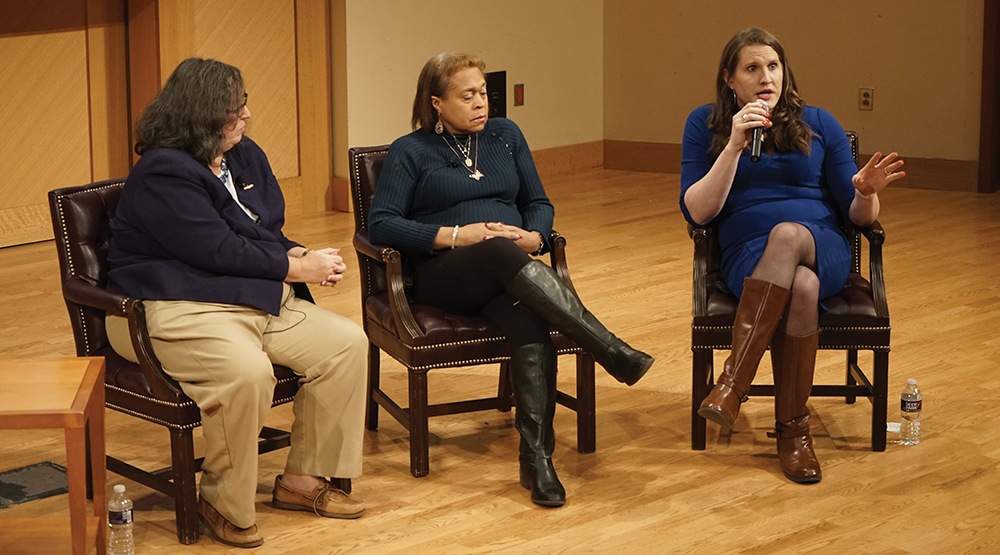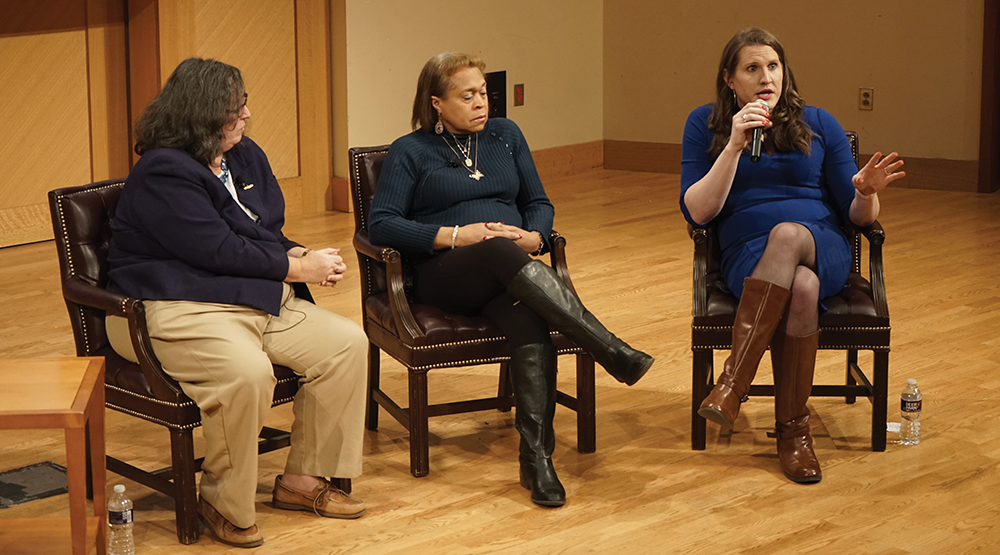U.S. policies that prevent members of the transgender community from serving in the armed forces contradict the core values of the military, panelists said at a Dec. 4 event.
The Spectra Alliance, a collaboration between the Georgetown University Student Veterans Association and GradPride, hosted the event, titled “The Lived Experience of Transgender Service Members & Veterans,” in Lohrfink Auditorium. The event featured a panel of three transgender military veterans who shared their personal experiences and perspectives on policies regulating transgender members of the U.S. military.
U.S. policies that compel transgender people to conceal facets of their identities in the military discredit the military’s character, according to panelist Paula Neira, U.S. Navy veteran and clinical program director at the Johns Hopkins Center for Transgender Health.

“We should never ask somebody to lie about who they are,” Neira said. “And we can’t have core values of honor and integrity and courage and expect people to lie to us because that corrodes the core values of the institution.”
In 2018, President Donald Trump’s administration implemented a new policy about transgender people joining the military. Anyone who has undergone cross-sex hormone therapy or sex reassignment surgery or who is unwilling or cannot meet the fitness requisites associated with their biological sex cannot join the military without a waiver, according to the Department of Defense.
Most individuals diagnosed with gender dysphoria, which is when someone experiences discomfort or distress that their biological sex and gender identity are mismatched, are disqualified from joining the military. However, individuals with gender dysphoria who have been “stable” for 36 consecutive months in their biological sex and are willing to serve in that sex are permitted to participate in the military, the Department of Defense wrote on their website.
The policy does not serve as a ban on transgender people in the military, according to the Department of Defense. The policies, however, effectively prevent transgender people from serving in the military, according to Neira.
“If you aren’t in the military today and you’re transgender and you want to join the military, you can’t,” Neira said. “If you’ve had any kind of gender-affirming treatment, you are forever banned from applying to the military under this policy.”
In 2016, then-Defense Secretary Ashton Carter lifted the ban on transgender people serving openly in the military for the first time. The Trump administration cited budgetary costs to justify reimplementing policies that inhibit transgender people’s participation in the military.
Defense Department data indicates that $8 million, or .016% of the $50 billion healthcare budget for active members of the military, has been used for transgender people between July 1, 2016 and Feb. 1, 2019.
The statistic discredits the Trump administration’s arguments that cost justifies regulations on transgender military members, panelist Charlotte Clymer, a U.S. Army veteran, said.
“Cost is not an issue,” Clymer said. “There are no reasons why trans people can’t serve. The only reason a trans person should not serve is if they can’t meet the military standard.”
Members of the U.S. military should be judged based on their skills and not excluded based on their identities, panelist Karen Kendra Holmes, a Maryland Defense Force veteran, said.
“We have a lot of trans people who are qualified and skilled,” Holmes said. “We put our time, effort and resources into training them and you’re going to get rid of them because they’re transgender? They saw what I was bringing to the unit, not because I was transgender because they didn’t even know.”
Over 134,000 American veterans are transgender, and over 15,000 transgender people are serving in the military today, according to the National Center for Transgender Equality. The U.S. government must eliminate barriers to transgender military service, according to Clymer.
“Our country should not be debating who someone loves or who they are, ever,” Clymer said.
Individuals should advocate for and support all members of the transgender community to combat harmful stereotypes, according to Holmes.
“None of us are the same,” Holmes said. “We need you to stand up for us. Stand up. If you hear something negative about somebody, stand up.”





















